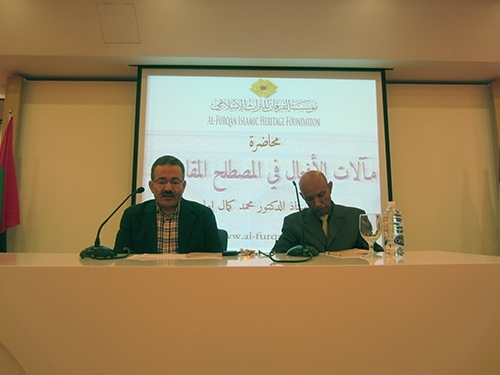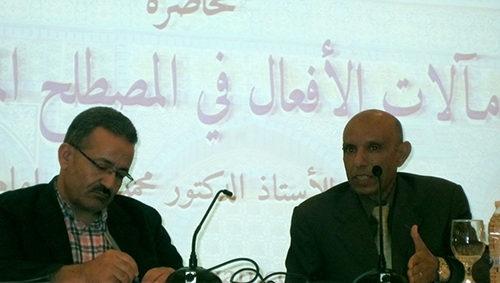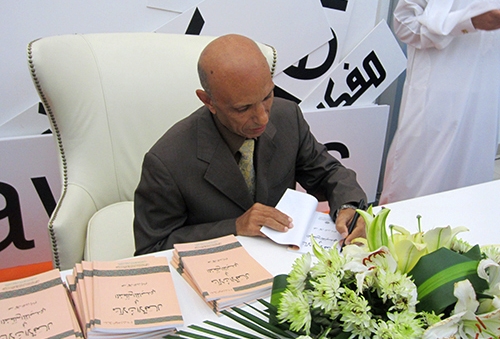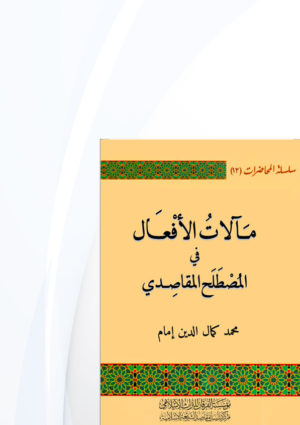On Friday 9th November 2012, one of the lecture halls at the Sharjah Expo Centre hosted a lecture organised by the Centre for the Study of the Philosophy of Islamic Law, which is affiliated to Al-Furqān Islamic Heritage Foundation. The lecture was entitled “Consequences of Acts in the Term of the Purposes of Islamic Law”, delivered by Dr. Mohammad Kamal Imam, who is a member of the Board of Experts of the Centre for the Study of the Philosophy of Islamic Law. The lecture was chaired by Dr. Ibrahim al-Bayoumi Ghanem, member of the Board of Experts of the Centre for the Study of the Philosophy of Islamic Law.

Dr. Ghanem introduced the lecturer’s intellectual life and gave a synopsis of the lecture to be delivered. He indicated, in particular, that the lecture was an addendum that completed the lecture on “The Public Interest in the Term of the Purposes of Islamic Law – a Functional Vision”. With the third forthcoming lecture entitled “Al-Ta‘leel (resort to the concept of ʿilla or cause) in the Terminology of the Objectives of Islamic Law”, Dr. Kamal Imam will have completed his series on the terminology of the objectives of Islamic law, which he dealt with in his impressive book Al-Daleel al-Irshādi ilaa Maqāṣid al-Sharīʿah al-Islāmīya (Bibliography for the Objectives of Islamic Law), published by the Centre for the Study of the Philosophy of Islamic Law.
At the outset of his lecture, Dr. Imam explained that the reason behind his study was to clearly define the concept of maqāṣid al-Sharīʿah, the objectives of Islamic law, through the analysis of its various elements and their linkage with the original constituents of this concept. Furthermore, he pointed out that jurisprudential research has demonstrated that the consequences of acts constitute a method used in dealing with the nawāzil (novel realities without a precedent in jurisprudence and needing novel fatwas) and with the practical issues in all the Islamic schools of thought. For him, the concept of consequences is the objective framework that guarantees the integrity of the work of the mujtahid (interpreter of the Holy Scriptures) when dealing with the rulings of Islamic law and their subsequent application to the acts of Muslims as mukallafeen (implementers of prescribed Islamic obligations). The lecturer also considers the consequences of acts as the framework for verifying the objectives of Islamic law as well as ascertaining the points from which the rulings are formed (manāṭāt al-af‘āl).
Furthermore, the lecturer pointed out that the investigation of the consequences of acts is linked to many sources of legislation. In fact the relationship between some of these sources and the consequences of acts, like the closing of the door of pretexts (sadd al-dhara’i‘), is a relationship of cause and effect, behaviour and result. This relationship has its extension in the link between the means and the objectives as legally permissible and granted. This is because each means that involves the implementation of the legislator’s intention in its regard, is legal, even if it is not allowed. Similarly, every means that clearly contradicts the legislator’s intention is invalid, even if it is originally permissible.

At the end of the lecture, Dr. Ghanem intervened to give an analytical comment of Dr. Imam’s lecture with regard to three issues:
1. The status of the concept of consequences in relation to the global uṣūli (fundamentalist) intellectual trend. He remarked in this respect that this aspect had not, so far, been given due attention by modern researchers and investigators, especially as its importance is due to the fact that it falls within the realm of positive law in its legal meaning. This is why conducting extensive research in the field of the consequences of acts will have its practical importance.
2. The consequences of acts in relation to the rule of dhara’i‘ (rule of pretexts), whether in ‘opening the door’ to the pretexts or ‘closing’ it. In this respect, Dr. Ghanem differed from Dr. Kamal Imam over his statement that this rule is part of the consequences of acts. In Dr. Ghanem’s view, the contrary is closer to the truth, since the necessity of ’opening or closing the door of pretexts’ presupposes an examination of the consequences of acts and of statements as well. Therefore, the more important framework is that of the rule of pretexts and within the latter falls the concept of the consequences of acts, the concept of precaution, the concept of legal stratagem and so on, which are part of the uṣūli (fundamentalist) system pertaining to future probabilities.3. The strength of the idea of the consequences of acts in the uṣūli terminology, stems from its pretention to open the jurisprudential mind as well as the Islamic mind in general into the future and to foster reflection on both private and public affairs from a futuristic point of view, in accordance with rules and regulations that are likely to help in identifying problems and in avoiding negative issues and harmful occurrences that are likely to take place. For all this, Dr. Ghanem does not believe that the uṣūli jurisprudential mind gives this futuristic aspect its due, in terms of exhaustive study, jurisprudential referencing and details to enable it to be part of intellectual as well as practical awareness at the same time.
The Book Signing Ceremony
Within the Book Fair activities, on Friday 9th November 2012, Al-Furqān Foundation organised a book signing ceremony by Dr. Kamal Imam, for his book “Consequences of Acts in the Term of the Purposes of Islamic Law”. The ceremony was attended by a number of interested individuals as well as researchers. It was also a good opportunity for the author to interact with his readers.



